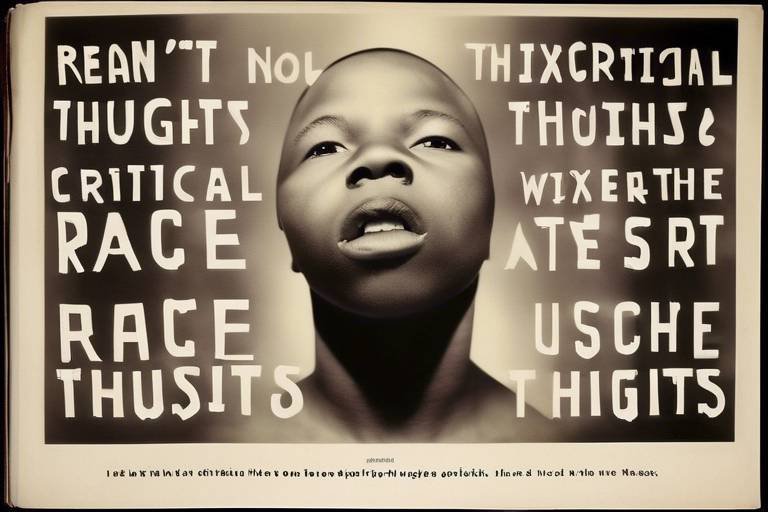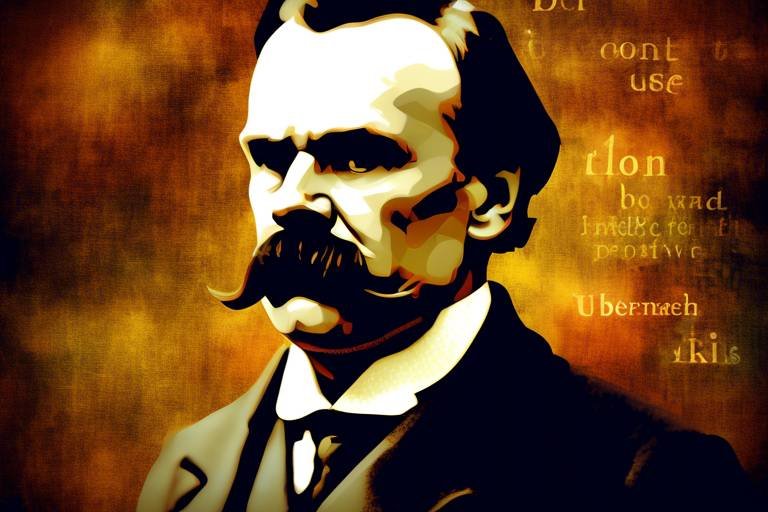Dealing with Regret - A Philosophical Approach
Regret is a feeling that can creep into our lives like a shadow, often lurking just beneath the surface of our daily thoughts. It’s that nagging voice in the back of our minds, reminding us of choices we wish we could change or moments we let slip away. But what if we could shift our perspective on regret? Instead of viewing it solely as a negative emotion, we might consider it a powerful tool for growth and understanding. This article explores the complexities of regret through a philosophical lens, offering insights on how to understand, cope with, and ultimately transcend feelings of regret in our lives.
Understanding what regret truly means can help individuals process their feelings. At its core, regret is a complex emotional response that arises when we reflect on past decisions, wishing we had taken a different path. It can lead to feelings of sadness, disappointment, and even guilt. Psychologically, regret is tied to our ability to evaluate choices and foresee potential outcomes. This evaluation process is crucial as it influences our future decision-making. When we regret a choice, we often find ourselves questioning our judgment and the values that guided us. It's like standing at a crossroads, looking back at the road not taken, and wondering what might have been. This reflection can be painful, but it also serves as an opportunity for deeper self-awareness.
Various philosophical traditions offer unique insights into regret. From the ancient Stoics to modern existentialists, thinkers have grappled with the implications of regret on human existence. These perspectives not only illuminate the nature of regret but also provide frameworks for coping with it. Understanding these philosophies can empower us to embrace our feelings of regret rather than shy away from them. For instance, existentialists argue that regret is an inherent part of the human experience, emphasizing the importance of personal responsibility in our choices. On the other hand, Stoics advocate for acceptance and focusing on what is within our control, which can help mitigate the impact of regret.
Existentialist philosophers emphasize personal responsibility and the weight of choices. They argue that every decision we make contributes to our identity and shapes our existence. This perspective frames regret as a necessary part of authentic living and self-discovery. When we experience regret, it serves as a reminder of our freedom to choose and the responsibilities that come with it. The connection between freedom and responsibility is crucial in existential thought. Regret arises from the choices we make and the responsibilities they entail, reminding us that our actions have consequences that ripple through our lives.
In the existential view, freedom is not just a privilege; it’s a burden. Every choice we make carries the weight of potential regret. This realization can be daunting, but it also empowers us to take ownership of our lives. When we acknowledge that we are the architects of our own destiny, we can begin to see regret not as a dead end, but as a stepping stone toward greater self-awareness. By understanding the link between our choices and their outcomes, we can approach future decisions with a more mindful perspective.
Interestingly, regret can lead to deeper self-reflection and understanding. Existentialists suggest that embracing regret can ultimately lead to personal growth and meaning. When we confront our regrets, we open the door to introspection. This process can reveal underlying values and desires that we may not have recognized before. By facing our regrets head-on, we can extract valuable lessons that inform our future choices. It’s like mining for gold in the rubble of our past; the more we dig, the more we uncover about ourselves.
Stoic philosophy offers practical strategies for managing regret. Stoics advocate for acceptance and focusing on what is within our control to mitigate feelings of regret. They remind us that while we cannot change the past, we can choose how to respond to it. This mindset encourages us to let go of the emotional weight of regret and instead focus on the present moment. By shifting our attention to what we can control, we free ourselves from the shackles of past decisions.
Overcoming regret is not just about forgetting the past; it’s about learning to live with it. This section provides strategies and techniques for moving past regret. One essential aspect is self-forgiveness. It’s vital to cultivate self-compassion and release oneself from the burdens of past mistakes. When we forgive ourselves, we create space for healing and growth. Mindfulness practices can also help individuals stay present and reduce the impact of regret. Techniques such as meditation and journaling can aid in processing and letting go of regretful feelings, allowing us to embrace the present with open arms.
Self-forgiveness is essential for overcoming regret. It’s a process that requires patience and understanding. To cultivate self-compassion, we can start by acknowledging our humanity. We all make mistakes; it’s part of being human. By recognizing that we are not alone in our experiences, we can begin to release the guilt that often accompanies regret. Practicing self-forgiveness allows us to move forward with a lighter heart, embracing our imperfections as part of our journey.
Mindfulness can help individuals stay present and reduce the impact of regret. By focusing on the here and now, we can diminish the power that past choices hold over us. Various mindfulness techniques, such as deep breathing, meditation, and mindful walking, can aid in processing and letting go of regretful feelings. These practices encourage us to observe our thoughts without judgment, creating a space for acceptance and healing.
- What is the first step in dealing with regret? The first step is acknowledging your feelings and understanding that regret is a normal human emotion.
- Can regret be beneficial? Yes! Regret can lead to valuable insights and personal growth when approached with the right mindset.
- How can I practice self-forgiveness? Start by recognizing your mistakes, understanding your feelings, and treating yourself with compassion as you would a friend.
- What mindfulness techniques can help with regret? Techniques like meditation, deep breathing, and journaling can help you stay present and process your feelings.

The Nature of Regret
Understanding what regret truly means can be a labyrinthine journey, filled with twists and turns that often leave us feeling lost. At its core, regret is an emotional response to our past decisions, a nagging reminder of the paths we didn’t take or the choices we wish we could change. It can manifest as a heavy weight on our shoulders, a constant echo of "what if" that reverberates through our thoughts. But why do we feel regret so intensely? Is it merely a byproduct of our decision-making process, or does it serve a deeper purpose in our emotional landscape?
From a psychological standpoint, regret is not just about feeling bad for our choices; it’s a complex amalgamation of emotions that can influence our future decisions. When we experience regret, we often find ourselves in a state of cognitive dissonance, where our actions clash with our values or desires. This internal conflict can lead to feelings of guilt, shame, and sadness. In fact, research has shown that the emotional pain associated with regret can be so profound that it affects our mental health, leading to anxiety or depression in some individuals.
Moreover, regret can serve as a powerful teacher. While it feels uncomfortable, it can also lead to profound insights about ourselves. When we reflect on our regrets, we often uncover valuable lessons that can inform our future choices. For instance, let’s say you regret not pursuing a career you were passionate about. This feeling can push you to reevaluate your current path and make changes that align more closely with your true self. In this way, regret can be a catalyst for personal growth and transformation.
To better understand the nature of regret, we can categorize it into two main types:
- Action Regret: This type arises from decisions we made that we wish we hadn’t taken. For example, ending a friendship or making a hasty career choice.
- Inaction Regret: This type comes from opportunities we missed or actions we didn’t take. Think about not traveling when you had the chance or not expressing your feelings to someone special.
These two forms of regret highlight the duality of our choices and the emotional responses they elicit. The weight of these feelings can vary significantly based on individual circumstances, personality traits, and the societal context in which we live. Some people may find it easier to let go of their regrets, while others may dwell on them, creating a cycle of negative thinking that can be hard to break.
In summary, the nature of regret is multifaceted and deeply intertwined with our emotional and psychological well-being. It can be a source of pain, but it also holds the potential for growth and self-discovery. By understanding our regrets, we can learn to navigate our emotional responses and perhaps find a way to transform this heavy burden into a stepping stone toward a more fulfilling life.

Philosophical Perspectives on Regret
When we dive into the realm of philosophy, we find a treasure trove of insights regarding the intricate feelings of regret. Various philosophical traditions have long pondered this emotional quagmire, providing us with a spectrum of interpretations that can help us navigate our own feelings. From the existentialists who emphasize personal responsibility to the Stoics who advocate for acceptance, each perspective offers a unique lens through which to view regret. Understanding these viewpoints not only enriches our comprehension of regret itself but also equips us with tools to manage it more effectively.
To start, let’s explore the existentialist perspective. Existentialist philosophers, such as Jean-Paul Sartre and Simone de Beauvoir, argue that our lives are defined by the choices we make. They posit that with every decision comes a weighty burden of responsibility, which inevitably leads to feelings of regret when we reflect on paths not taken. In this view, regret is not just a negative emotion; rather, it's a vital part of the human experience that propels us toward authenticity and self-discovery. It’s as if regret serves as a compass, guiding us back to our true selves when we stray too far into the realm of societal expectations.
Now, consider how existentialism frames the connection between freedom and responsibility. The freedom to choose is a double-edged sword; while it empowers us, it also exposes us to the consequences of our decisions. Regret, in this context, is a natural byproduct of our freedom. When we make choices, we inherently accept the possibility of regret. This realization can be both liberating and daunting. It encourages us to embrace our decisions, knowing that they shape our identity and our journey through life.
Furthermore, existentialists suggest that within the depths of regret lies an opportunity for profound meaning. Rather than viewing regret as a burden, we can reframe it as a catalyst for growth. By confronting our regrets, we engage in deep self-reflection, leading to greater understanding of our desires and motivations. This process can illuminate our paths forward, allowing us to make more informed choices in the future. It’s akin to a sculptor chiseling away at a block of marble; each regret is a strike of the chisel that reveals the masterpiece within.
On the flip side, we have the Stoic approach to regret, which offers practical strategies for managing these feelings. Stoic philosophers like Marcus Aurelius and Epictetus emphasize the importance of focusing on what is within our control. They teach us that while we cannot change the past, we can control our reactions to it. This perspective encourages acceptance of our past decisions, urging us to let go of what cannot be changed. By doing so, we can mitigate the emotional turmoil that often accompanies regret.
In essence, both existentialism and Stoicism provide valuable insights into the nature of regret. They invite us to reflect on our choices, embrace our freedom, and cultivate a mindset that fosters personal growth. By understanding these philosophical perspectives, we can better navigate the complex landscape of our emotions and emerge stronger on the other side.
- What is the main philosophical perspective on regret? Different philosophies offer various insights; existentialists emphasize personal responsibility, while Stoics focus on acceptance.
- How can understanding regret lead to personal growth? Embracing and reflecting on our regrets can help us make better choices in the future.
- Is regret always a negative emotion? Not necessarily; it can serve as a catalyst for self-discovery and authenticity.

Existentialism and Regret
Existentialism, a philosophical movement that emphasizes individual freedom and choice, offers a profound lens through which to understand the concept of regret. At its core, existentialism posits that we are the architects of our own lives, responsible for the decisions we make and the paths we choose. This inherent responsibility can be both liberating and burdensome, as it places the weight of our existence squarely on our shoulders. Regret, then, becomes an inevitable companion on our journey, a reminder of the choices we could have made differently. But rather than viewing regret solely as a negative experience, existentialists encourage us to embrace it as a vital component of authentic living.
When we experience regret, it often stems from a deep sense of longing for what might have been. Perhaps we made a choice that led to unforeseen consequences, or maybe we hesitated when we should have acted. This feeling can be likened to standing at a crossroads, where every decision branches out into a multitude of potential futures. The existentialist perspective invites us to reflect on this metaphor: while we may feel stuck in our regrets, we also possess the power to redefine our narrative. Each regret can serve as a stepping stone toward self-discovery, pushing us to explore our values, desires, and the very essence of who we are.
Consider the words of famous existentialist philosophers like Jean-Paul Sartre and Simone de Beauvoir. They argued that our choices define us, and with each decision comes the potential for regret. Yet, this is not a cause for despair. Instead, it is an opportunity for growth. By acknowledging our regrets, we can engage in a process of self-examination that fosters a deeper understanding of our motivations and aspirations. This journey often leads to a more authentic existence, where we learn to accept the past while actively shaping our future.
Furthermore, existentialism teaches us that the act of regretting is not merely about lamenting lost opportunities; it is also about recognizing our freedom to choose differently in the future. This perspective can be empowering. It reminds us that while we cannot change the past, we can influence our present and future decisions. In this way, regret transforms from a heavy burden into a catalyst for personal evolution.
In summary, existentialism frames regret as an essential part of the human experience. It encourages us to confront our feelings of remorse, not to wallow in them, but to use them as a compass guiding us toward a more meaningful existence. By embracing our regrets, we can cultivate a richer understanding of ourselves and ultimately lead lives that resonate with authenticity and purpose.
- What is existentialism? Existentialism is a philosophical movement that emphasizes individual freedom, choice, and responsibility, focusing on the meaning of existence.
- How does regret relate to existentialism? Regret is viewed as a natural outcome of our choices and is essential for personal growth and self-discovery within the existential framework.
- Can regret be beneficial? Yes, when approached thoughtfully, regret can lead to deeper self-reflection and a more authentic life.
- How can I cope with feelings of regret? Embracing mindfulness, practicing self-forgiveness, and reframing your thoughts can help manage feelings of regret.

Freedom and Responsibility
When we talk about freedom, it's easy to get swept away in the idea of having endless choices at our fingertips. But here’s the kicker: with freedom comes responsibility. This relationship between freedom and responsibility is a cornerstone of existential thought, and it’s crucial for understanding how regret weaves itself into our lives. Think of it this way: every choice we make is like a fork in the road, and each path has consequences. When we choose one direction, we inevitably leave the other paths behind, often leading to feelings of regret about what could have been.
Existentialists argue that every decision we make shapes our identity and our future. This means that our regrets aren’t just random feelings; they are signals from our past that remind us of the weight of our choices. For instance, if you chose to pursue a career in finance instead of following your passion for art, you might find yourself grappling with regret. But rather than viewing this regret as a burden, existentialists suggest that it can serve as a powerful tool for self-discovery. By reflecting on these feelings, we can gain insights into what truly matters to us.
Moreover, the freedom to choose is what makes us human. It’s what allows us to shape our destinies. However, with this freedom comes the reality that we must own our choices, both good and bad. This ownership is where responsibility enters the picture. It’s not enough to simply make a choice; we must also accept the outcomes, whether they are favorable or not. This acceptance can be incredibly liberating. By acknowledging our role in the choices we make, we can begin to understand that regret is not just a feeling of loss but an opportunity for growth.
To illustrate this connection between freedom and responsibility, let’s consider a simple table that highlights key aspects:
| Aspect | Description |
|---|---|
| Freedom | The ability to make choices without external constraints. |
| Responsibility | The obligation to accept the consequences of our choices. |
| Regret | A feeling that arises when we reflect on the consequences of our choices. |
So, how do we navigate this intricate dance between freedom and responsibility? It starts with embracing the idea that our choices define us. Instead of shying away from regret, we can use it as a compass to guide our future decisions. By reflecting on past experiences, we can learn valuable lessons that inform our next steps. This proactive approach helps us transform regret into a powerful catalyst for change.
In the end, freedom and responsibility are two sides of the same coin. They are intertwined in a way that shapes our human experience. By recognizing this connection, we can begin to see regret not as a chain that holds us back, but as a stepping stone toward a more authentic and fulfilling life.
- What is the relationship between freedom and responsibility? Freedom allows us to make choices, while responsibility requires us to accept the consequences of those choices.
- How can regret lead to personal growth? By reflecting on our regrets, we can gain insights into our values and make more informed decisions in the future.
- What role does self-forgiveness play in overcoming regret? Self-forgiveness helps us release the burdens of past mistakes, allowing us to move forward with greater clarity and purpose.

Finding Meaning in Regret
Regret is often seen as a dark cloud hovering over our decisions, a nagging reminder of what could have been. Yet, within this shadow lies a potential for profound personal growth and understanding. When we take a moment to reflect on our regrets, we can uncover valuable lessons that can illuminate our paths forward. Instead of viewing regret solely as a negative emotion, consider it a catalyst for transformation. Just like a sculptor chisels away at a block of marble to reveal a masterpiece, we can use our regrets to shape our lives into something more meaningful.
One of the most significant aspects of finding meaning in regret is the opportunity for self-reflection. When we examine our past choices and the emotions tied to them, we often discover underlying values and desires that drive our decisions. This introspection can lead to a clearer understanding of what truly matters to us, helping us make more aligned choices in the future. For instance, if someone regrets not pursuing a particular career path, this feeling may reveal a deep-seated passion for that field. Acknowledging this can inspire them to explore new opportunities or hobbies related to that passion, ultimately enriching their life.
Moreover, embracing our regrets allows us to cultivate a sense of empathy toward ourselves and others. When we recognize that everyone experiences regret, it can foster a sense of connection and shared humanity. This understanding can transform our regrets into a source of compassion, both for ourselves and those around us. As we navigate our own feelings of regret, we might find ourselves more forgiving and understanding of others who face similar struggles.
To further illustrate how we can find meaning in regret, consider the following points:
- Regret as a Teacher: Each regret carries a lesson. By identifying what we can learn from our past, we can turn painful experiences into valuable insights.
- Redefining Success: Regret can challenge our definitions of success. It invites us to reconsider what we genuinely want in life, shifting our focus from societal expectations to personal fulfillment.
- Encouraging Courage: Facing our regrets head-on can cultivate courage. It encourages us to take risks and make choices that align with our true selves, rather than succumbing to fear of failure.
Ultimately, finding meaning in regret is about reclaiming our narrative. Instead of allowing regret to define us, we can choose to view it as a stepping stone toward a more authentic existence. By embracing our regrets, we not only honor our past but also empower ourselves to create a future that resonates with our deepest values and aspirations. So the next time regret knocks on your door, invite it in for a cup of tea. You might just find that it has some important lessons to share.
Q: How can I start finding meaning in my regrets?
A: Begin by reflecting on your past decisions and identifying the lessons each regret holds. Journaling can be a helpful tool to articulate your thoughts and feelings.
Q: Is it normal to feel regret?
A: Absolutely! Regret is a common human experience. It’s important to acknowledge your feelings and understand that they are part of the journey of life.
Q: Can regret lead to positive changes in my life?
A: Yes, regret can serve as a powerful motivator for change. By learning from your past, you can make more informed choices that align with your values and goals.
Q: How do I let go of regret?
A: Practice self-forgiveness, engage in mindfulness techniques, and focus on the present moment. Remember, it’s about progress, not perfection.

Stoicism's Approach to Regret
When it comes to dealing with regret, Stoicism offers a refreshing perspective that can transform how we view our past choices. The Stoics believed that while we cannot change what has already happened, we can control our reactions and attitudes towards those events. This principle is at the heart of Stoic philosophy, which emphasizes the importance of focusing on what is within our control and accepting what is not. Imagine standing at a fork in the road, with one path leading to regret and the other to acceptance. Stoicism encourages us to take the path of acceptance, thereby freeing ourselves from the shackles of regret.
One of the key Stoic thinkers, Epictetus, famously stated, “It’s not what happens to you, but how you react to it that matters.” This quote encapsulates the essence of Stoicism’s approach to regret. Instead of dwelling on past mistakes, Stoics advocate for acknowledging our feelings of regret and then consciously choosing to let them go. They argue that regret can serve as a teacher, revealing valuable lessons about our values, priorities, and the nature of our choices. By reflecting on our decisions without being consumed by negativity, we can cultivate a mindset that fosters growth and resilience.
To further illustrate this perspective, let's consider a few practical strategies that Stoics recommend for managing regret:
- Acceptance: Acknowledge your feelings of regret without judgment. Understand that it’s a natural human emotion.
- Reframe Your Thoughts: Instead of viewing regret as a burden, see it as an opportunity for growth. Ask yourself what you can learn from the experience.
- Focus on the Present: Practice mindfulness by bringing your attention back to the present moment. This can help diminish the emotional weight of past regrets.
- Practice Gratitude: Reflect on the positive aspects of your current life. This shift in focus can help you appreciate what you have rather than what you lack.
Implementing these strategies can help us cultivate a more Stoic mindset, allowing us to navigate the turbulent waters of regret with grace and wisdom. By embracing the Stoic principles of acceptance and self-control, we can learn to see our regrets not as chains that bind us, but as stepping stones on the path to self-improvement. Ultimately, Stoicism teaches us that while we cannot erase our past, we have the power to shape our present and future.
What is the Stoic view on regret?
The Stoic view on regret emphasizes acceptance and the importance of focusing on what we can control. Stoics believe that while we can't change the past, we can choose how we respond to it.
How can I apply Stoicism to my feelings of regret?
You can apply Stoicism by acknowledging your feelings of regret, reframing your thoughts to see the lessons in your experiences, and practicing mindfulness to stay present.
Is it normal to feel regret?
Yes, feeling regret is a normal human emotion. Stoicism teaches us to accept these feelings without letting them define us or hinder our growth.

Overcoming Regret
Regret can feel like a heavy backpack filled with stones, dragging us down as we try to move forward in life. But what if I told you that overcoming regret isn't just about unloading that backpack? It's about transforming those stones into stepping stones! The journey to overcome regret involves a blend of self-forgiveness, mindfulness, and reframing our thoughts. Each of these elements plays a crucial role in helping us navigate the turbulent waters of regret and emerge stronger on the other side.
First and foremost, self-forgiveness is a vital ingredient in the recipe for overcoming regret. We often hold onto guilt and shame like a badge of honor, thinking it will somehow make us better people. However, clinging to these feelings only serves to weigh us down further. Instead, we need to practice self-compassion, recognizing that we are all fallible human beings who make mistakes. To cultivate self-forgiveness, consider these methods:
- Acknowledge Your Mistakes: Accept that you made a choice that didn't pan out as expected.
- Reflect on the Lessons: What did this experience teach you? How can you use this knowledge in the future?
- Practice Kindness Towards Yourself: Speak to yourself as you would to a friend who is struggling. Be gentle.
Next, let’s talk about the power of mindfulness. Mindfulness is like a lighthouse guiding us through the fog of regret. By anchoring ourselves in the present moment, we can reduce the impact of those nagging feelings of regret that often stem from ruminating on the past. Engaging in mindfulness practices can help us develop a clearer perspective on our regrets. Some effective mindfulness techniques include:
- Breathing Exercises: Simple deep breathing can ground you and bring your focus back to the now.
- Body Scan Meditation: This practice helps you connect with your body and release tension associated with regret.
- Mindful Journaling: Writing down your thoughts and feelings can provide clarity and facilitate emotional release.
Finally, it’s essential to reframe negative thoughts surrounding regret. Instead of viewing regret as a permanent stain on your character, try to see it as a temporary experience that contributes to your growth. Ask yourself questions like, “What can I learn from this?” or “How can I use this experience to better myself?” By shifting your perspective, you can transform regret into a powerful motivator for change.
In conclusion, overcoming regret is a journey that requires patience and practice. By embracing self-forgiveness, engaging in mindfulness, and reframing our thoughts, we can lighten our emotional load and transform our regrets into valuable life lessons. Remember, it’s not about erasing the past but rather about learning to walk alongside it gracefully.
- How can I start practicing self-forgiveness? Begin by acknowledging your mistakes and treating yourself with kindness, just as you would with a friend.
- What mindfulness techniques are most effective? Breathing exercises, body scans, and mindful journaling are great ways to practice mindfulness.
- Can reframing my thoughts really help? Yes! Changing your perspective on regret can turn it into a catalyst for personal growth.

The Role of Self-Forgiveness
Self-forgiveness is a vital component in the journey of overcoming regret. It’s like shedding a heavy coat that you’ve been wearing for too long; once you let it go, you feel lighter and more at ease. Regret, while a natural human emotion, can become a suffocating burden if you don't learn to forgive yourself for past mistakes. Think about it: how often do we hold ourselves to impossibly high standards? We’re our own worst critics, replaying our missteps in our minds like an old movie stuck on repeat. But what if we could change the script?
To truly embrace self-forgiveness, it's essential to understand that everyone stumbles. Life is a series of choices, and sometimes those choices lead us down paths we wish we hadn't taken. Acknowledging this is the first step toward freeing ourselves from the chains of regret. Imagine a friend who has made a mistake; you would likely offer them support and understanding, right? Now, try to extend that same kindness to yourself. It's not just about saying, "I forgive myself," but genuinely feeling it in your heart.
So, how can we cultivate self-compassion and embrace self-forgiveness? Here are a few strategies that can help:
- Recognize Your Humanity: Understand that making mistakes is part of being human. Remind yourself that everyone has moments they wish they could take back.
- Reflect on the Lessons Learned: Instead of focusing solely on the regret, shift your perspective to what you’ve learned from the experience. This can transform a painful memory into a valuable lesson.
- Practice Self-Compassion: Treat yourself with the same kindness you would offer to a loved one. Speak to yourself in a supportive tone and avoid harsh self-judgment.
Self-forgiveness isn’t a one-time event; it’s an ongoing process. It requires patience and practice, much like building a muscle. You may find that some days are easier than others, and that’s perfectly okay. The key is to keep moving forward, even if it feels like you’re taking baby steps. Each small act of self-forgiveness brings you closer to healing and allows you to reclaim your narrative.
As you embark on this journey, consider keeping a journal. Writing about your feelings can provide clarity and allow you to express emotions that might otherwise remain bottled up. You might find it helpful to list out your regrets and then write a counter-statement for each, emphasizing forgiveness and understanding. This practice can serve as a powerful reminder that you are more than your mistakes.
Ultimately, self-forgiveness opens the door to personal growth. It allows you to move past the regret and embrace the future with a renewed sense of purpose. By letting go of the past, you create space for new experiences and opportunities. Remember, you deserve the same grace you extend to others. So, take a deep breath, and allow yourself to forgive. It’s a gift you can give to yourself, one that will lead to a more fulfilling and regret-free life.

Mindfulness Practices
When it comes to navigating the turbulent waters of regret, mindfulness practices serve as a lifeboat, helping us stay anchored in the present moment. Imagine regret as a heavy backpack filled with stones, each representing a past decision or missed opportunity. Mindfulness encourages us to set down that backpack and focus on the here and now, allowing us to lighten our emotional load. By cultivating mindfulness, we can learn to observe our thoughts and feelings without judgment, creating a safe space for self-reflection and healing.
One powerful mindfulness practice is meditation. Just a few minutes of daily meditation can significantly shift your perspective on regret. Find a quiet spot, sit comfortably, and close your eyes. Focus on your breath, letting each inhale and exhale ground you in the present. Whenever thoughts of regret creep in, acknowledge them without resistance, then gently bring your focus back to your breath. This simple act can help you understand that while regret is a part of life, it doesn't have to define you.
Another effective technique is mindful journaling. Taking the time to write down your thoughts can be incredibly cathartic. Start by reflecting on the regrets you hold. What do they teach you? How have they shaped who you are today? As you write, try to approach these reflections with curiosity rather than judgment. This practice can help you gain clarity and insight, transforming regret from a heavy burden into a valuable teacher.
Incorporating mindfulness into your daily routine can also be beneficial. For instance, during your morning coffee or evening walk, take a moment to focus on your senses. What do you see, hear, or smell? Engaging fully with the present can help you break free from the cycle of regret. Remember, mindfulness is about embracing the now, and every moment spent in awareness is a moment free from regret.
To further enhance your mindfulness journey, consider joining a local meditation group or exploring online resources. Many platforms offer guided meditations specifically designed to address feelings of regret and promote self-forgiveness. These communal practices can provide support and encouragement, reminding you that you are not alone in your struggles.
Ultimately, mindfulness is a powerful ally in overcoming regret. By practicing mindfulness regularly, you can cultivate a mindset that embraces the present, allowing you to learn from the past without being shackled by it. Remember, it's not about erasing regret but about transforming it into a stepping stone for growth and self-discovery.
- What is mindfulness? Mindfulness is the practice of being fully present and engaged in the current moment, without judgment. It helps individuals observe their thoughts and feelings, promoting a sense of calm and clarity.
- How can mindfulness help with regret? Mindfulness allows individuals to acknowledge their feelings of regret without becoming overwhelmed by them. It encourages self-reflection and helps transform regret into a learning experience.
- Do I need experience to practice mindfulness? No, mindfulness can be practiced by anyone, regardless of experience. Simple techniques like focusing on your breath or observing your surroundings can be a great starting point.
- How often should I practice mindfulness? Regular practice is key. Even a few minutes each day can make a significant difference over time. Find a routine that works for you, whether it's daily meditation or mindful moments throughout your day.
Frequently Asked Questions
- What is regret and why do we feel it?
Regret is an emotional response to past actions or decisions that we wish we could change. It often stems from a sense of responsibility for the outcomes of our choices. When we reflect on what might have been, it can lead to feelings of sadness or disappointment. Understanding this feeling can help us process it better.
- How can philosophy help us deal with regret?
Philosophy offers various perspectives on regret, helping us understand its role in our lives. Existentialists view regret as a part of authentic living, emphasizing personal responsibility. On the other hand, Stoics teach acceptance and focusing on what we can control, which can provide practical strategies for coping with regret.
- What are some practical strategies for overcoming regret?
To move past regret, consider practicing self-forgiveness, which allows you to release the burden of past mistakes. Mindfulness techniques, such as meditation and deep breathing, can help you stay present and reduce the emotional weight of regret. Reframing negative thoughts into positive lessons can also foster personal growth.
- How does self-forgiveness play a role in overcoming regret?
Self-forgiveness is crucial because it allows you to let go of guilt and shame associated with past actions. By practicing self-compassion, you can acknowledge your mistakes without being overly harsh on yourself. This process not only alleviates feelings of regret but also promotes healing and personal development.
- Can mindfulness really help reduce feelings of regret?
Absolutely! Mindfulness encourages you to focus on the present moment rather than dwelling on the past. By engaging in mindfulness practices, you can learn to observe your thoughts and feelings without judgment, which can significantly lessen the grip of regret on your emotional well-being.



















